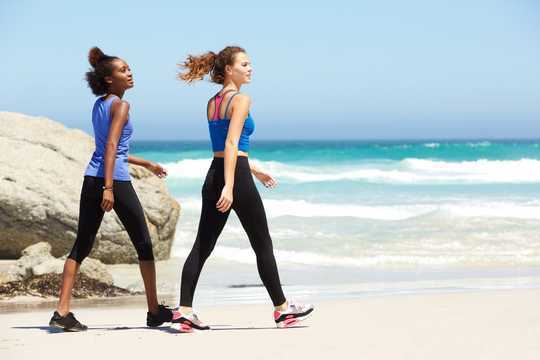
Wearables might not offer enough motivation to get your daily steps, but a little competition might work.
Researchers combined behavioral insights, gaming elements such as points and levels, and social elements like support, collaboration, or competition to generate significantly positive results in a workplace physical activity program. But when the study, called STEP UP, turned off the gaming elements, only participants in the competition group sustained higher levels of physical activity.
“Gamification and wearable devices are used commonly in workplace wellness programs and by digital health applications, but there is an opportunity to improve their impact on health behaviors by better incorporating behavioral insights and social incentives,” says Mitesh Patel, the director of Penn Medicine’s Nudge Unit and an assistant professor of medicine and health care management.
“We found that a behaviorally designed gamification program led to significant increases in physical activity compared to a control group that used wearable devices alone. During the nine-month trial, the average person in the competition arm walked about 100 miles more than the average person in control.”
Get The Latest By Email
Daily steps
For six months, roughly 600 employees from Deloitte Consulting LLP in 40 US states took part in a physical activity program. Each participant classified as obese or overweight had daily, personalized step goals, with steps recorded via wearable devices that provided feedback to the participants. Researchers formed four groups: One in which participants only had their goals and the device, and three others with games tied to their goals.
The “gamified” groups could achieve points and different tiers, or “levels.”
Importantly, researchers designed the games to use principles from behavioral economics. This included having all participants sign a commitment contract, before beginning, pledging to strive for their daily goal, agreeing to have points allocated upfront lost—instead of gained—if they didn’t meet goals, and having a “fresh start” each week with a new set of points. Additionally, there were five levels to the game. Each participant started at the middle, which allowed for progression or regression based on goal achievement. Researchers adapted all the elements from a previous clinical trial that tested a similar approach among families.
Each gamified group centered around a social element. The support group participants chose a “sponsor” who received a weekly notification of whether participant reached the step goals and could provide encouragement or motivation.
Researchers split the collaboration group into teams of three. Each day, they randomly selected a member to represent the team and, if they reached their goal on the prior day, the whole team kept its points.
Researchers also split the competition group into clusters of three who received a weekly leaderboard email showing their individual rankings compared to each other.
Who benefits?
During the six-month intervention, the gamification with competition group increased their physical activity by 920 steps per day more than control, a significant difference. Support and collaboration also lead to significant increases of 689 and 637 steps more per day than control, respectively.
The real difference between the arms of the study showed up in the three months after the gamification turned off. Only participants in the competition group saw a lasting effect, with a 569 daily step increase compared to control. Both former collaboration and support employees averaged more steps than the control group, but neither were significant.
Researchers say the data collected from each participant on a wide range of characteristics including demographics, personality type, and social networks will be key to the next steps of the study.
“Most interventions are designed as one-size-fits-all, in which a single intervention is deployed to a large population,” Patel says. “Even if the program works on average, many participants may not benefit. Our next step will be to use data from this trial to develop behavioral profiles that could be used in the future to match the right intervention to the right person.”
About the Authors
Deloitte Consulting and Penn funded the study, which appears in JAMA Internal Medicine.
Source: Penn
books_fitness







